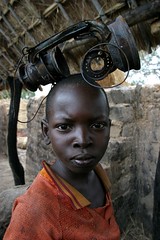I must start by explaining how much I learned this week through the suggested reading! Like many others I have used Wikipedia without really thinking about how it works or the structure and organisation that lie behind it. I was vaguely aware that there were other wiki-projects but had no idea which were part of the Wikipedia Foundation and which were not. Now I feel much more knowledgeable!
Here is a list of some of the points I found to be most impressive...
- The sheer audacity of the concept – that given the opportunity Internet users would collectively create an encyclopaedia to rival the classic encyclopaedias such as the Britannica
- The amounts of time people are willing to give freely to create, maintain and improve these commons projects. The principle described by Benkler(2) of the breaking down of tasks into small units must be helpful here – If a lot of people feel able to give just a few minutes or an hour of their time that adds up to a lot of hours! However, there still seems to be a number of people who donate a considerable quantity of their time, perhaps because the system offers non-financial rewards such as status and promotion within an (unpaid) structure. Various technical tools, such as templates, also help users to utilise their time efficiently.
- The emergence of “a sophisticated set of processes” (2) that have developed to increase the quality of the material and the fact that these arose through self-organising (collective choice) arrangements. This seems to be a very open and democratic process and even the discussions that lead to these rules and principles are (mostly) also still accessible on the “talk” pages.
- The ongoing nature of the projects. Development continues and as it does so the quality threshold is raised and what was acceptable earlier is no longer of a sufficiently high standard. Examples of this are the evolution of Featured articles in Wikipedia and Featured Pictures in Wikimedia Commons. Logically this means that if the English Wikipedia was almost comparable to Encyclopaedia Britannica in 2005 (See Nature magazine's blog) then in the future (now?) it will be superior to Britannica, assuming that does not also improve.
- The local nature of the Wikimedia Foundation’s projects. Each language can have its own version of each project and it was interesting to read in Dirk Riehle’s interview with “three leading practitioners of three different Wikipedias how the practices vary from country to country. This reflects Ostrom’s first organisational principle(2); congruence between rules and local conditions. Different languages and cultures have different needs and perhaps require different structures to fulfil those needs. I was at first surprised for example that the Italian Wikiversity’s front page did not have the same layout as the English Wikiversity. After a little reflection I felt pleased that there was room for diversity within these projects and that the English language/culture was not dictating to the rest of the world! Another surprise for me was that several smaller languages were well represented in some of these projects. For example the third largest Wiktionary language is Vietnamese!
- How and Why Wikipedia Works: An Interview with Angela Beesley, Elisabeth Bauer, and Kizu Naoko by Dirk Riehle.
- The Hidden Order of Wikipedia by Fernanda B. Viégas, Martin Wattenberg and Matthew M. McKeon.
- Wikimedia projects

1 comment:
I don't think anyone actually expected Wikipedia to get this huge, this quickly. When I started editing, in early 2004, I was *really impressed* that Wikipedia was #500 website in the whole world. Now we're #8 and every minute of every day is a "WTF?!" moment ...
Post a Comment